Luuk Rietveld on sabbatical leave in Costa Rica, 2020
Decentralised drinking water supply in Costa Rica
There are many discussions about the advantages and disadvantages of decentralised water supply. In the Netherlands I make use of a very well functioning centralised system. Here in Costa Rica my house is supplied by a decentralised system. Water is abstracted from a spring and is transported to a collection well from where it is pumped to some reservoirs higher up hill and from there it supplies my house by gravity (after some type of filtration). From my own experience I can now reflect on such a system. First of all the advantages: the water is pure (although not checked), no chemical additions, no chlorine, no advanced treatment; it tastes wonderful and we drink it straight from the tap without direct problems; it is cheap, because we only pay the energy costs for pumping (investments are already done in the past and are part of the house rent); since we must activate the pump manually, we are very much aware of the water we use, when toilets are leaking, or too much water is used for gardening, with the consequence that we change our patterns. However, there are also disadvantages to mention: In periods of (relative) droughts less water is available in the spring and the system can fall dry; when the collection well is dry (or you forget to activate the pump when the well is full), there is no water in the high reservoirs and you do not have water in your house; when you re-establish the situation your in-house system is full of air and you still have difficulties to obtain sufficient water for e.g. showering. The good thing is that I am on sabbatical leave and that I can afford to spend time in running the system, but… coming back to the Netherlands I will certainly appreciate the excellent water supply (with excellent quality control) by, in my case, Dunea…. Below some impressions of the decentralised system of my house.
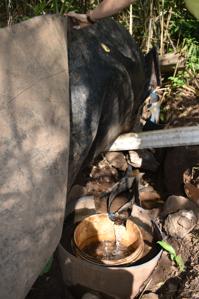
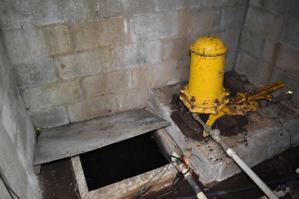
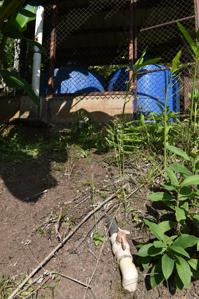
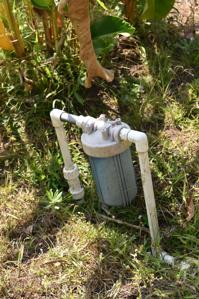
Removing aluminium from drinking water in San Marcos
The drinking water of San Marcos is characterized by a relatively high aluminium content and a low pH. During several studies performed by students and staff from both TEC and TU Delft, it was concluded that just increasing the pH would result in floc formation and consequent removal of the aluminium. Therefore, several pilot tests were performed by leading the raw water over a marble (calciumcarbonate) filter. During filtration the pH was increased and aluminium was removed. Therefore it was time to perform a full scale pilot for a community of about 80 people. A pressure vessel was obtained, which was filled with the calciumcarbonate. In one day the piping was fixed, leading, at the end of the day, the water by gravity through the filter and, after chlorination, to the storage tank. The next day the samples were taken and it was confirmed that the aluminium content was below WHO standards (and pH was increased). Below an impression of the construction and sampling works.
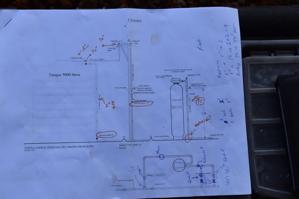
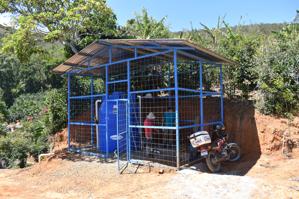
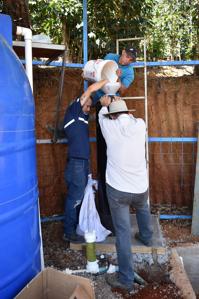
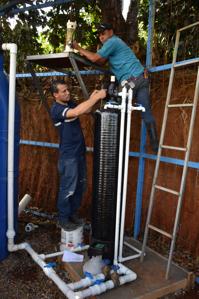
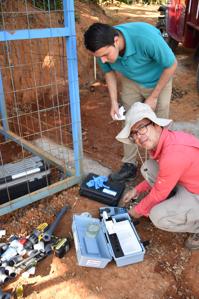
Participation in the “Docinade” in Costa Rica
During the “Docinade” in San Carlos, Costa Rica, PhD students from all over Central America presented their work and obtained feed-back from experts in their field. The PhD students were mainly experienced professionals working in various themes. Water was part of the “Natural Resources theme” and topics like Arsenic removal with egg shells and banana peels in Nicaragua, and water quality monitoring in rivers in Guatemala and Costa Rica were presented.
I was asked to open the conference with a key note speech on drinking water supply in the Netherlands and the challenges we have and how we can translate them to Central America. Of particular interest for them was the collaboration we have between universities, knowledge institutes, water companies,water boards, and consultant firms in order to enhance innovation and application.
Various institutes and universities in Costa Rica, Nicaragua, Guatemala and Colombia expressed their interest to further collaborate with the Netherlands.
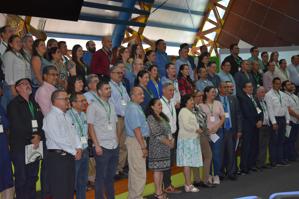
Participants in Docinade
On mission to El Salvador
During my first weeks in Costa Rica I was immediately requested by IHE Delft to be part of a mission to El Salvador. The capital of San Salvador is at the moment suffering from quality problems in the drinking water. These are probably the result of algae growth due to low flows in the river, high temperatures and occasionally nutrients used in upstream agriculture. More then one million inhabitants are dependent on the water supply from the river and the dry season will only end in the month of May. Therefore, together, with ANDA, the national water company, and several ministries in El Salvador we, IHE Delft and TU Delft, will searching for short term and long term solutions for a more sustainable water supply in San Salvador.
On the Photographs, you can see the algae in the river and the problems that are present to remove them by filtration.
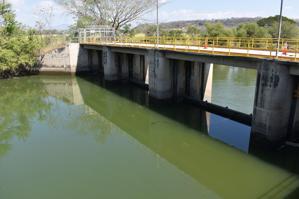
View of river with algae
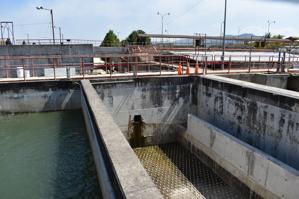
Filters trying to remove algae
Hello world!
Welcome to my weblog. Here I will share some highlights during my sabbatical leave in Costa Rica

Recent Comments